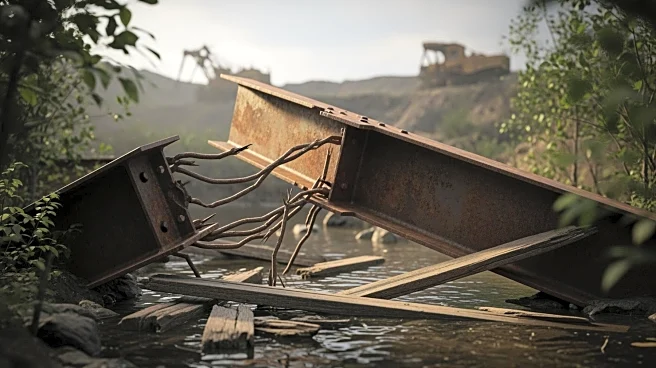What's Happening?
A catastrophic bridge collapse at the Kalando mine in the Democratic Republic of the Congo has resulted in the deaths of at least 32 people, with reports suggesting the toll could be as high as 40. The
incident occurred when miners rushed across a makeshift bridge, which collapsed due to overcrowding. The mine, located in the southeastern Lualaba province, has been the site of ongoing disputes between wildcat miners and legal operators. The collapse has prompted provincial authorities to suspend operations at the site, and calls for an independent investigation into the military's involvement have been made.
Why It's Important?
The bridge collapse at the Kalando mine highlights significant safety and regulatory challenges within the DR Congo's mining sector. As the world's largest producer of cobalt, the country plays a crucial role in the global supply chain for lithium-ion batteries. However, the incident exposes the precarious conditions under which many miners operate, often without adequate safety measures. The tragedy may lead to increased scrutiny of mining practices and pressure on both local and international stakeholders to address safety, labor rights, and environmental concerns. The involvement of Chinese companies in the sector adds a layer of complexity to the geopolitical and economic implications.
What's Next?
In response to the disaster, provincial authorities have suspended operations at the Kalando mine, and there are calls for an independent investigation into the military's role in the incident. The Initiative for the Protection of Human Rights has emphasized the need for accountability and transparency in the investigation process. The outcome may influence future regulatory changes and impact the operations of mining companies in the region. Additionally, the incident could lead to heightened international attention on the ethical and safety standards of cobalt mining in the DR Congo.
Beyond the Headlines
The collapse at the Kalando mine underscores the broader issues of exploitation and unsafe working conditions in the DR Congo's mining industry. Accusations of child labor and corruption have long plagued the sector, and this incident may catalyze efforts to reform mining practices. The geopolitical dynamics, with Chinese companies controlling a significant portion of cobalt production, could also affect international relations and trade policies. The tragedy may serve as a catalyst for change, prompting stakeholders to prioritize human rights and safety in the pursuit of economic gains.








